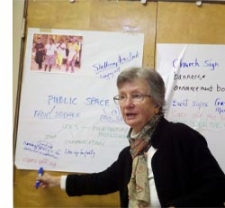May 7, 2012
Silence in the Office and the Meeting Room
For the first time in my life I have my own office. In the past I’ve shared offices, sat at the receptionist’s desk, which was basically in a glass box, and had a desk in the office lobby, where I never knew when my boss would pop out of his office or the doorbell would ring. Now, I have my own space with a door I can shut if I need some uninterrupted time to work.
There’s been a movement in recent years at various organizations to do away with walls and cubicles to make it easy to collaborate, and we’ve all sat in brainstorming meetings, gathered around a conference table while someone stands at a whiteboard with a marker in hand.
 We’re beginning to learn, however, that these methods don’t work, at least not for everyone. Recent articles in the New Yorker and The New York Times point out that brainstorming meetings actually produce fewer (and weaker) ideas than when individuals come up with ideas on their own. And, as I have been finally realized while I sit in my office occasionally with the door closed: many of us need our own space.
We’re beginning to learn, however, that these methods don’t work, at least not for everyone. Recent articles in the New Yorker and The New York Times point out that brainstorming meetings actually produce fewer (and weaker) ideas than when individuals come up with ideas on their own. And, as I have been finally realized while I sit in my office occasionally with the door closed: many of us need our own space.
Likewise, not everyone finds it easy to speak up in a meeting. Personally, I find it difficult to speak in a group larger than four or five. The loudest and most outgoing get the most airtime, but they don’t always have the best ideas.
The church has long understood the value of solitude. From Moses up on the mountain to Jesus taking time outs in the garden, we know that we can’t always live in the company of others. We’ve learned that time to ourselves, downtime, a few hours to daydream or pray or simply relax and let things percolate are essential for living a spiritual life.
It turns out these lessons are also true for a productive life. As I mentioned in my column here two weeks ago, I read Susan Cain’s Quiet, which debunks the myth of collaboration. People are most productive individually, especially when trying to solve a problem. Working together doesn’t work for everyone, and it doesn’t work all the time. We can’t do everything alone, of course, but meetings are not the primary way to get things done.
Making uninterrupted time for individuals to work out problems is good business practice and good practice for church staffs and vestries. If we’re constantly in meetings or being interrupted, then the quiet, creative voice in our head doesn’t have time to speak.
Churches will get the most out of their volunteers and staff if the leadership understands them and their personalities, and recognizes that not everyone thrives in the same work environment. Not everyone wants to collaborate or feels comfortable speaking in meetings. And everyone needs both time to work together and time alone. We also need to make time for silence in our meetings and offices, so that the quiet voices on our staff and the other still, silent voices in our lives can be heard.





